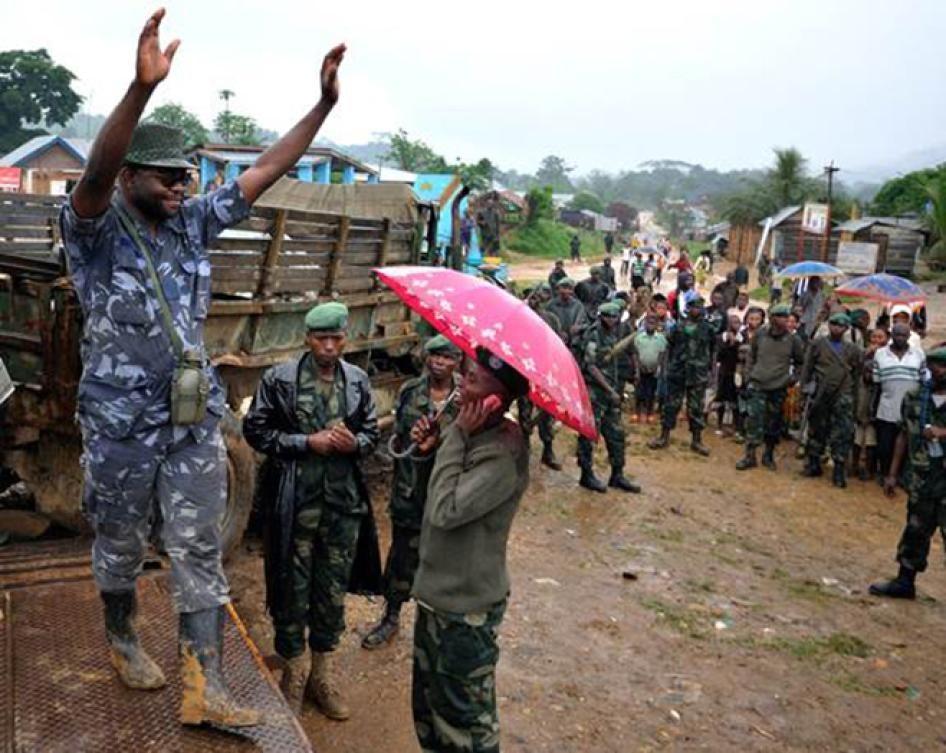(Goma) – The trial of a militia leader for mass rape and other grave crimes is crucial for justice in the Democratic Republic of Congo. Ntabo Ntaberi Sheka is being prosecuted for crimes against humanity, war crimes, terrorism, and related charges in a trial that began on November 27, 2018 in the eastern city of Goma.
Congolese judicial authorities, with the support of the United Nations peacekeeping mission in Congo, should ensure that justice is done in a fair, credible, and impartial manner, and provide victims meaningful redress. The authorities should also rigorously carry out measures to ensure the safety of victims, witnesses, defendants, and others involved in the proceedings.
“Sheka’s trial marks an important moment for justice for thousands of victims of rape and other ghastly crimes in eastern Congo,” said Ida Sawyer, deputy Africa director at Human Rights Watch. “Ensuring a fair trial for those accused of the most serious crimes is a crucial step in ending the cycles of violence and impunity that have plagued the region for over two decades.”
Between July 30 and August 2, 2010, Sheka's militia, known as the Nduma Defense of Congo (NDC), and two other armed groups raped at least 387 women, men, girls, and boys in 13 villages along the road from Kibua to Mpofi in eastern Congo’s Walikale territory in North Kivu province, according to a United Nations investigation. The other armed groups include the Democratic Forces for the Liberation of Rwanda (FDLR) and a group made up of Congolese army deserters.
Since Congolese authorities issued an arrest warrant for Sheka in January 2011, Human Rights Watch has documented further abuses by forces under his command. They included the targeted killings of at least 70 civilians, many of whom were hacked to death by machete. In some cases, Sheka’s fighters mutilated the bodies and paraded the body parts around town while chanting ethnic slurs. Sheka’s forces have also raped more women and girls and forcibly recruited scores of young men and boys into their ranks.
“When the NDC arrived in our village, we were taken by force,” a young woman who was held as a sex slave by Sheka’s forces for four months in 2013 told Human Rights Watch. “I was only 17-years-old then. They took us to a camp in the forest. There could have been 20 girls there, and we were all about the same age. Sheka was there [in the camp]. I saw him myself.”
Sheka stands trial with his private nurse and trusted confidante, Jean Ndoole Batechi; an NDC fighter, Jean Claude Kamutoto; and Séraphin Nzitonda (known as “Lionceau”) of the FDLR. Another co-accused and former NDC fighter, Sadoke Kikunda Mayele, died under unclear circumstances in prison in Goma in August 2012. Sheka and Batechi are currently being held at a military prosecutor’s facility in Goma, where a cell has been specially built to ensure their security.
Congolese judicial officials, with the support of UN peacekeepers, attempted to arrest Sheka as early as July 2011, but he escaped, allegedly tipped off by Congolese authorities. Four months later, Sheka openly ran for public office in eastern Congo, and police made no effort to arrest him as he held public campaign rallies. After that, government and UN officials met with Sheka on three occasions, encouraging him to surrender but making no effort to arrest him. He surrendered to the UN in July 2017. He was first held at a prison in the capital, Kinshasa, then transferred to Goma on November 13, 2018. Sheka has been under sanctions by the United Nations Security Council since 2011.
Congolese authorities have issued arrest warrants for five other men for the 2010 mass rape, including one FDLR combatant who has since been killed and four Congolese army deserters who remain at large.
Human Rights Watch has found that some Congolese army officers, Rwandan officials, and other armed groups, including the Rwandan-backed M23 rebel group, provided financial and logistical support to Sheka’s armed group. Congolese judicial officials should examine these allegations at the trial to uncover the responsibility of high-ranking government and army officials in abuses by Sheka’s forces.
Previous investigations and prosecutions by Congolese authorities for grave international crimes provide important lessons about steps that should be taken to ensure fair, impartial, and meaningful justice in the context of the Sheka trial. These include the 2014 trial against Congolese army soldiers implicated in a mass rape in and around the town of Minova in eastern Congo in 2012. Problems that emerged during that process included lack of a solid investigative and prosecutorial strategy, political interference to protect higher-ranking commanders and officials, and a failure to respect the rights of the accused to a fair and impartial trial.
It is also critically important for Congolese authorities to address the safety of those participating in the proceedings – the accused, victims, witnesses, and activists involved with the trial. Since November 2017, at least four human rights activists who supported the Congolese investigation into Sheka’s alleged crimes have had to relocate after facing serious threats.
As in the Minova trial, Sheka is being tried by a military operational court, which does not allow for the right to appeal that is guaranteed in the Congolese constitution. Congolese authorities should ensure that all criminal defendants have the right to appeal before all jurisdictions in Congo, Human Rights Watch said.
“Holding human rights abusers to account is critical for bringing abuses to an end,” Sawyer said. “But for justice to be meaningful, trials must be fair and all those participating must feel confident of their safety.”








